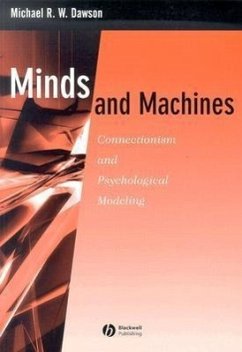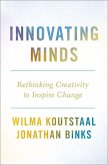Models are important tools in psychology used to generate predictions to test the validity of theories. Minds and Machines: Connectionism and Psychological Modeling examines three different kinds of models (models of data, mathematical models, and computer simulations) and discusses a synthetic approach to modeling. Connectionist models are introduced as tools that are both synthetic and representational and that can be used as the basis for conducting synthetic psychology. The book investigates some of the basic properties of connectionism in the context of synthetic psychology, including detailed accounts of how the internal structure of connectionist networks can be interpreted. A website of supplementary material is available at www.bcp.psych.ualberta.ca/ mike/Book2/ and includes free software for conducting the connectionist simulations described in the book as well as instructions for building simple robots to illustrate some of the principles of the synthetic approach.
Hinweis: Dieser Artikel kann nur an eine deutsche Lieferadresse ausgeliefert werden.
Hinweis: Dieser Artikel kann nur an eine deutsche Lieferadresse ausgeliefert werden.
"In this remarkable book, Dawson refines and developssynthetic psychology - an approach to explainingmental capacities that takes as its inspiration the investigationof simple systems exhibiting emergent behavior. Rich with examples,the book shows with extraordinary clarity how ideas from embodiedcognitive science, robotics, artificial life, and connectionism canbe combined to shed new light on the workings of the mind. It'shard to imagine a better book for anyone wishing to understand thelatest advances in cognitive science." Larry Shapiro, Universityof Wisconsin
"Minds and Machines provides an easily understoodintroduction to synthetic psychology - start with simpleprocesses, see what emerges, and analyze the resulting system.Dawson lays a solid foundation describing the strengths andweaknesses of various modeling approaches in psychology, and thenbuilds on this by giving concrete examples of how connectionism- using the synthetic approach - can be used to providesimple explanations of seemingly complex cognitive phenomena."David A. Medler, The Medical College of Wisconsin
"Thisis a wonderful book, both in terms of the thought-provokingtechnical content and the delightfully conversational style thatreaders have come to expect from the author of UnderstandingCognitive Science. Dawson has a real gift for presentingcomplex ideas in an accessible and engaging way that does notdilute the scientific or philosophical intricacies involved."Stefan C. Kremer, University of Guelph, Canada
"An important virtue of this book is that the content and orderof presentation has clearly been tested at length in the classroomof a dedicated and creative teacher. The book has manyillustrations from teaching practice, and would be an excellentbasis for a senior undergraduate or introductory graducate courseon cognitive modelling, and I'd be delighted to use it for thatpurpose myself ... This is a fine book, and I suspect it would be avaluable resource for those who don't know much about syntheticpsychology but would like to get a clear sense of the lie of theland." David Spurrett, University of KwaZulu-Natal, Psychologyin Society, 30, 2004, 77-79
"Minds and Machines provides an easily understoodintroduction to synthetic psychology - start with simpleprocesses, see what emerges, and analyze the resulting system.Dawson lays a solid foundation describing the strengths andweaknesses of various modeling approaches in psychology, and thenbuilds on this by giving concrete examples of how connectionism- using the synthetic approach - can be used to providesimple explanations of seemingly complex cognitive phenomena."David A. Medler, The Medical College of Wisconsin
"Thisis a wonderful book, both in terms of the thought-provokingtechnical content and the delightfully conversational style thatreaders have come to expect from the author of UnderstandingCognitive Science. Dawson has a real gift for presentingcomplex ideas in an accessible and engaging way that does notdilute the scientific or philosophical intricacies involved."Stefan C. Kremer, University of Guelph, Canada
"An important virtue of this book is that the content and orderof presentation has clearly been tested at length in the classroomof a dedicated and creative teacher. The book has manyillustrations from teaching practice, and would be an excellentbasis for a senior undergraduate or introductory graducate courseon cognitive modelling, and I'd be delighted to use it for thatpurpose myself ... This is a fine book, and I suspect it would be avaluable resource for those who don't know much about syntheticpsychology but would like to get a clear sense of the lie of theland." David Spurrett, University of KwaZulu-Natal, Psychologyin Society, 30, 2004, 77-79








